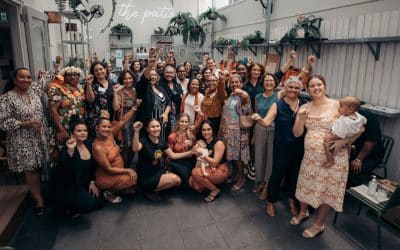
The 5 Big Reasons Why Your Business Is Better Working With Indigenous Business.
I’m the owner of an Indigenous firm and because I’ve been seeing it happen, it always surprises me when I see other businesspeople oblivious to one of the fastest growing sectors in the economy.
If you’re one of ‘them’, let me get you up to speed. The past decade has seen a seismic economic shift for First Nations People in Australia. Unprecedented numbers of us are forming businesses and going through the hard slog that every business owner goes through to be successful.
And we’re winning. In 2016, 12,000 Indigenous-owned firms across the country contributed a record $1 billion to the economy[1] and since then its growth has accelerated. With year-on-year 12.5% p.a. revenue growth forecast to continue, it is a success story that is changing people’s futures and it boils down to two things; firstly Indigenous people being given the chance to do it and secondly non-Indigenous Australia giving us a good crack at it.
Neither really existed a decade ago and the combination is a game changer for Aboriginal and Torres Strait Islander people.
So why might it be good for your business to engage with Indigenous businesses?
1. It’s your opportunity multiplier, especially if you want to work with the big end of town. Almost every leading ASX company now has its own Reconciliation Action Plan to engage with Indigenous people and business as part of its corporate governance. It’s good for them and its good to show you’re on the same path. Your first step to your firm’s own RAP is here https://www.reconciliation.org.au/reconciliation-action-plans/
Part of a good RAP will be engaging with Indigenous business. If you don’t know some already, find them at Supply Nation https://supplynation.org.au/. This is the national register of the thousands of Indigenous-owned business and whether it’s your next catering need, construction or landscaping job, cleaning contract, legal representation or joint venture this is where you’ll find them.
2. It opens new markets. As a law firm representing Indigenous firms, we’re seeing increasing numbers of joint ventures being formed with non-Indigenous businesses to everyone’s mutual benefit. A major driver has been the Commonwealth’s procurement policy[2] to award 3% of government work to Indigenous business or their joint ventures. That has been in operation since 2015 and since then State and Territory governments have followed suit to see thousands of contracts worth hundreds of millions of dollars being delivered by Indigenous businesses ever since. Last year that spend topped $1 billion thanks in no small part to these JVs that are allowing Indigenous businesspeople to take on bigger and better contracts with the extra capacity their JVs give.
These contracts cover a gamut of goods and services across sectors including construction, facilities management and catering as well as professional services, fire safety and even cryogenics.
But it’s not just government work. Since 2014 the Business Council of Australia (BCA) reported its member have spent more than $2 billion with Indigenous business [2] and there is nothing on the horizon to indicate that will not stop growing more rapidly.
One area of massive new opportunity sits with NSW’s 120 Local Aboriginal Land Councils (LALCs). New NSW laws have just given the LALCs the same zoning and planning powers as local councils. The new NSW State Environmental Planning Policy (Aboriginal Land) 2019 unlocks the intention of the NSW Aboriginal Land Rights Act (1983) (ALRA) which is to give back unneeded Crown land to LALCs for Aboriginals to use as property to generate income for its most often asset poor Indigenous families living in their area. It allows LALCs to deal directly with NSW Planning for development approval[3] to intentionally bypass the systemic bias of suburban and city councils green-zoning all LALC land so nothing can be developed.
It also gives LALCs the fastest land approval route for any privately owned land in NSW, a very attractive proposition for large property developers to play their role in realising LALC development ambitions through joint ventures, partnerships and the like. .
4. It’s good for your people. If you’re an Australian or employ Australians who have views on Indigenous people without actually knowing any, engaging with Indigenous business will change that. You’ll find we’re just like everybody else, how important our families are and our culture too, how all we’ve only ever wanted is to be on a level playing field and how we’re willing to work hard to make that happen. You might even get glimpses Australia from an Indigenous person’s eyes and hear family histories of hardship and discrimination that most Australians never heard of until a couple of decades ago.
What will also happen is you’ll learn how to deal with cultures outside of your own – a handy skill for a multicultural Australia as well as dealing with overseas clients.
5. It’s old knowledge done new. For more than 200 years we were taught that First Australian’s were primitive or for my mob the Pakana/Palawa of Tasmania ‘the missing link’. Today that’s been turned on its head with more and more being revealed about the depth and wisdom of our Indigenous systems. We now know Aboriginal people were making bread 12,000 years before the Ancient Egyptians figured it out, that we were growing fields of grain in areas modern farmers could only dream of,[4] that we were engineering thousands of years before Stonehenge[5] was knocked into place and that we had the most stable societies humanity has ever known. Our Indigenous knowledge is something all Australians should be able to respect, be proud of and take advantage of for our collective good. That’s happening thanks to Indigenous entrepreneurs using ancient wisdom to find smarter and better ways of solving modern problems and getting the job done.
And finally, it’s great for our people. Putting to one side that Indigenous businesses are hitting disadvantage like it has never been hit before, it’s worth noting that it wasn’t so long ago when it was near impossible for an Aboriginal or Torres Strait Islander person to run a successful business because of prejudice and laws preventing them from doing it. As late as 1984 in Queensland where I now live, legislation existed giving the government the power to take an Indigenous person’s property as well as stopping them from moving around the state like any other Australian could.[6]
Fast forward to 2019 and that’s completely changed with both government, the private sector and more and more of mainstream Australia wanting us to be part of their commercial success by working with us. From where I sit, it’s probably the most positive and exciting story in the Australian economy today and we’re excited to be part of it.
If you’re an Indigenous entrepreneur or organisation needing commercial legal help or would like more information on what Marrawah Law can do for your needs go to http://marrawahlaw.com.au/ or contact me or my colleagues on 07 4041 3088 or reception@marrawahlaw.com.au
Marrawah Law wins big at Supply Nation Supplier Diversity Awards
MEDIA RELEASE Australia’s leading independent Indigenous law firm, Marrawah Law, was...
Marrawah Law proudly hosts International Women’s Day in Cairns
Earlier this week Marrawah Law proudly hosted an event in Cairns for...
High praise as top legal eagle takes two gongs
PALAWA woman Leah Cameron (Brown) have fond memories of Tasmania. But she knew from a...
Diversity is increasingly seen as an advantage in business
As the owner of an Indigenous/female owned legal practice I have seen a dramatic uptick...
Marrawah Law celebrates Doyle’s recognition
The Marrawah Law team are today celebrating both the firm’s progression in the rankings...
Why we are proud to be a Supply Nation certified Indigenous business
As I reflect on 2020 and the year that was, I am particularly proud of the outcomes we...






